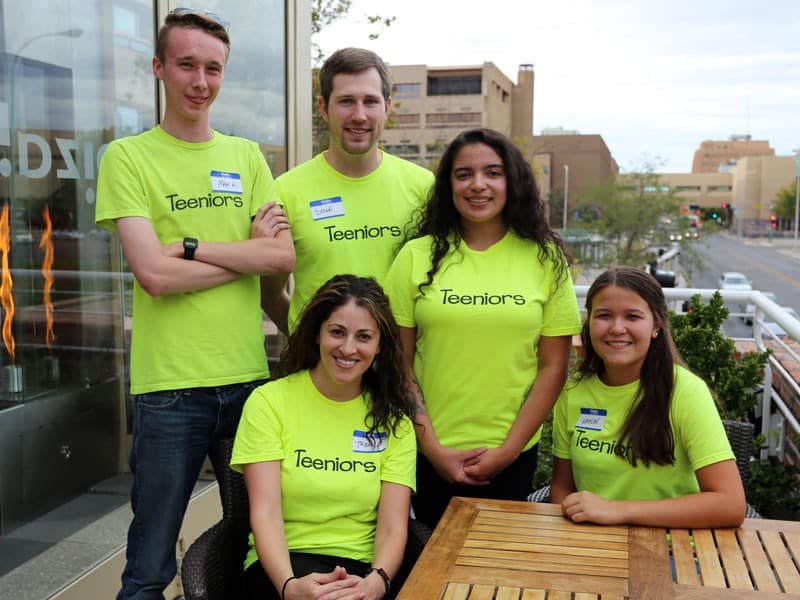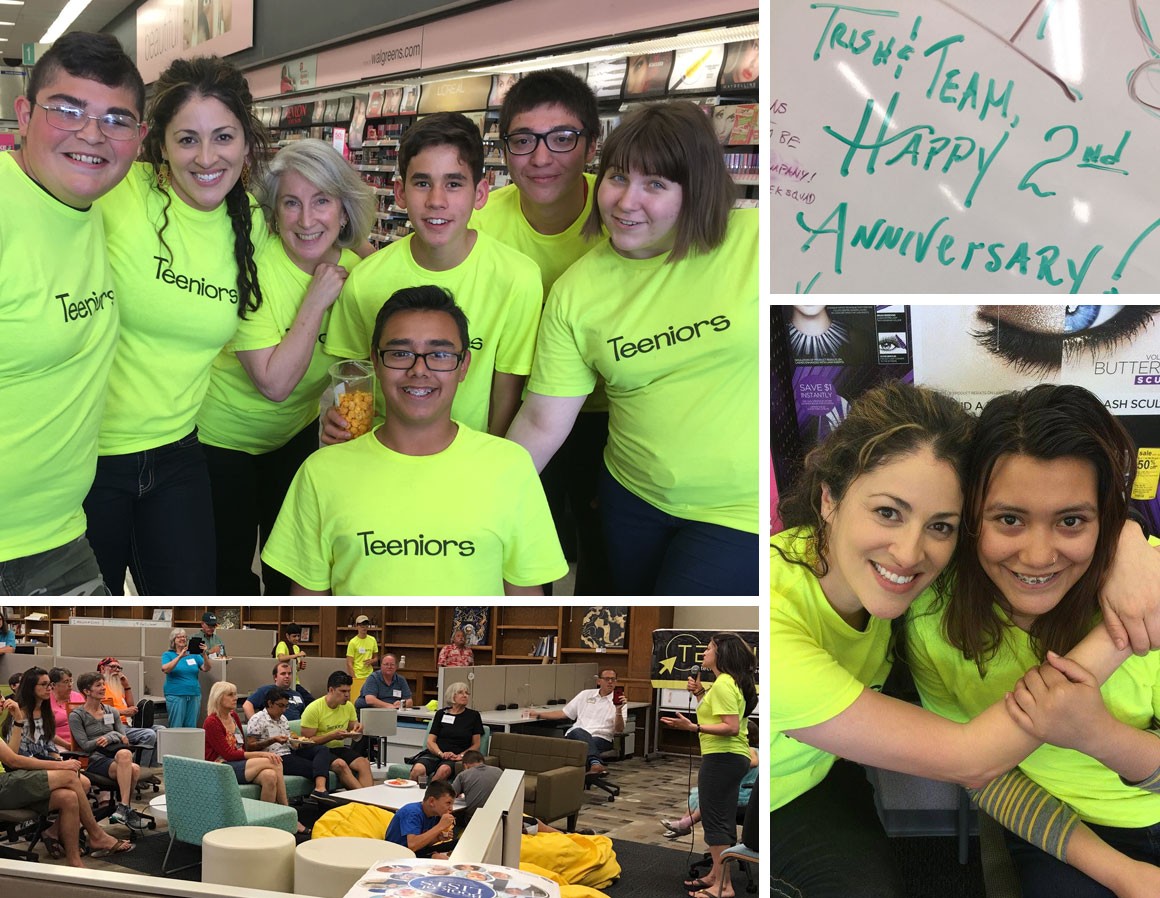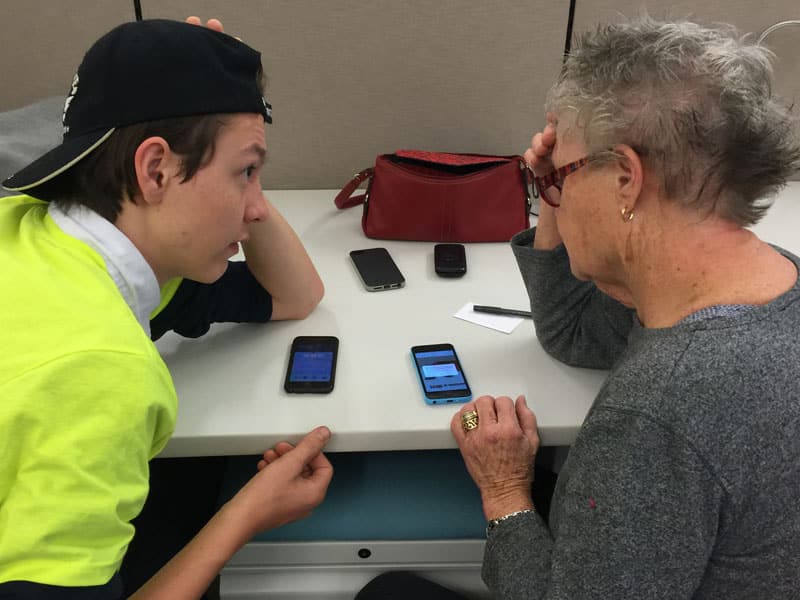Trish Lopez is the founder and CEO of Teeniors™, a social entrepreneurial small business based in Albuquerque, New Mexico. Having seen her own mother struggle to adapt to the digital world and learning about the lack of intergenerational opportunities, she was determined to find a community solution to help both seniors and young adults.
Knowing nothing about startups, she attended the first ever Startup Weekend Women New Mexico where she pitched the idea for Teeniors™ and won. Despite the hard journey, Trish has succeeded in creating a vibrant platform that connects youth and elders of all ages across central New Mexico. Teeniors™ has earned multiple new business awards and worked with nearly a thousand older adults while providing meaningful jobs for teens and young adults across the state.
MiLLENNiAL met up with Trish Lopez in Albuquerque to hear her story and meet a few of her young, talented tutors.
Tell us how you conceived Teeniors™ and explain the mission behind the local business.
Teeniors™ are tech-savvy teens and young adults who help seniors learn technology through one-on-one, personalized coaching. Whether it’s a smartphone, computer or software – our goal is to empower seniors to connect with their loved ones and engage with the world through technology, while also providing meaningful jobs for young adults.
How this was conceived: my mom, Lillian – she’s 78 and loves technology. She likes reading CNN on her smartphone, checking out Facebook photos of our family. She also hates technology, several times a month, when my brothers and I get the phone call. Gmail loses her password, Microsoft loses her documents, and we can’t always be there to help. Plus, we’re not the most patient teachers in the world. Turns out, we’re not alone in this problem. There are millions of Lillians out there – those over 65 and even those over 50. For these people, and those of us who love them, we created Teeniors™.

You worked for the state prior to launching Teeniors™. What challenges do you face now as a social entrepreneur and what adjustments did you have to make transitioning from the public to the private sector?
The transition from public to private sector was actually really easy because I had worked in the private sector for many years before Teeniors™ (since high school). It wasn’t until I moved back to New Mexico at 29 yrs old after being hired by our then-Governor as a legislative director, then later transferred to the NM Film Commission to oversee independent filmmakers’ programs. The public sector is a worthwhile experience for anyone because it can vastly improve your understanding of how government works, the implications of who you vote for, what happens when you don’t vote, and how the world works from this perspective. It can be disenchanting because it takes so long to get things done, but it’s bureaucratic by nature because you’re dealing with taxpayer dollars.
The private sector positions I’ve been in require you to bring your ‘A game’, because jobs are competitive, bosses and clients have to be kept happy, and it’s easier to lose your job if you’re not on top of it. I’ve liked having the experience of both. There are challenges to each sector, but at the core, it’s not about public or private. The main problems arise with egos and greed. Dealing with people who only focus on profit in the private sector; dealing with those who cater more to political party or special interests than constituents in the public sector – this tends to bring the problems.
One of my favorite quotes is by Harry Truman – it applies to so many things in life: “It is amazing what you can accomplish if you do not care who gets the credit.”
Computer literacy and a basic understanding of digital technology are vital to modern communication. Explain the process that both the young adult tutors and the senior students go through in their journey together.
It’s different for everyone. Some clients are 80 years old learning a smartphone for the first time. Teaching that person how to “FaceTime” their grandkids in another state can be amazing to witness. Another might be 55 and just wants to learn the features of their smart phone or how the cloud works. Some want you to repeat the process ten times, others want answers to a few questions, then they‘re good to go. It’s actually a very natural process to see youth and elders working together, it’s just rare in our society. I believe that young and old belong together – we learn from each other.

Teens tell us all the time how moved they are by this work, how they’ll “always be a Teenior™”. Some come back on their vacations from college just to work with us again. For seniors, our society has been very backwards in how we isolate and disregard people as they age. This causes horrible emotional and health issues. It’s the same on the other end of the spectrum for young people who crave human connection away from their devices or the drama of high school.
Many of our wonderful coaches are very shy, introverted people – and yet they’re rock stars in this work, continuously praised, and it creates enormous strides in their self-confidence. Our coaches go from being completely underestimated, to the most valued person in the room. They’re respected for their knowledge and appreciated for their help. Examples of this appreciation have brought many of our clients and our coaches to tears.
Teeniors was launched with the assistance of an acclaimed business accelerator. What were the pros and cons of the experience and would you recommend startups using a similar type of funding option if given the opportunity?
I was given $20,000 for 6% of the company. This was great because at the time, I had nothing more than an idea that had won 1st place at a Startup Weekend. I needed money to cover the initial costs, legal fees, insurance, labor, office rent; and would not have had the confidence to take time off my consulting work to pursue this without the accelerator. I needed funding but also just the moral support of someone else with skin in the game.
What was challenging about that particular accelerator (at the time) was that it was it’s own startup, only two years old. There were a lot of kinks that needed to be ironed out as to what their goals were. I didn’t get a mentor until the program was almost finished, I didn’t see a ton of diversity among the board or their thinking about how different businesses could work, and there was a lot of pressure to conform to the “scale as fast as you can” model, which is not something I believe in. The benefits were definitely that initial funding, and the fact that it offered business connections in a city that I had been away from for 13 years. In general, it helped someone like me, who knew NOTHING about starting a business, learn the basics.

What is your educational background and how did your degree and work experience help you navigate the entrepreneurial waters?
I have a bachelors in communication and criminology – I originally thought I would go to law school. After landing an internship at Sony Studios, then entering a management training program at Warner Bros., I learned a ton about the corporate world. Formal education mostly helped me open doors to better work opportunities. People like to see that you can start something and you can finish something. My work experience has helped much more in navigating life though. From McDonalds to waiting tables, to assisting lawyers and working in the film industry, it’s provided me with incredible learning opportunities and life experiences. There is no profession I can think of where communication skills aren’t vital. The better you can articulate a message, the better every relationship in your work and personal life will be.
On a personal side, how do you balance running your own company with managing a family? What advice would you give young adults juggling marriage, parenthood and careers all at the same time?
Personally I have found it incredibly difficult to maintain a good romantic relationship, a good parental relationship, and a business at the same time. Incredibly difficult. I want to be the most present parent possible first and foremost. The advice I would share is for young adults who are in relationships to ASK their partners what they think of the idea (pursuing / running their own business), and if you care about that relationship more than the venture, take their input seriously. Make sure they understand the time and energy commitment you’re signing up for. How will they handle that financially, but also time-wise when work becomes overwhelming (it’s not if, it’s when). I would also strongly suggest knowing the answer to the question of how YOU define success in this venture, not how society defines it, or your parents, or your significant other. How do YOU define success? If you and your partner are aligned on this, it’s going to make life much easier.
If you live in the Albuquerque area or just want learn more about Trish Lopez and Teeniors™ visit the website or go to Facebook.
Related Reading:
How Ike Fontaine Takes the Lead on Client Acquisition Through Podcasting
How David Adelman is Shaking Up the Industry With American Harvest Vodka
